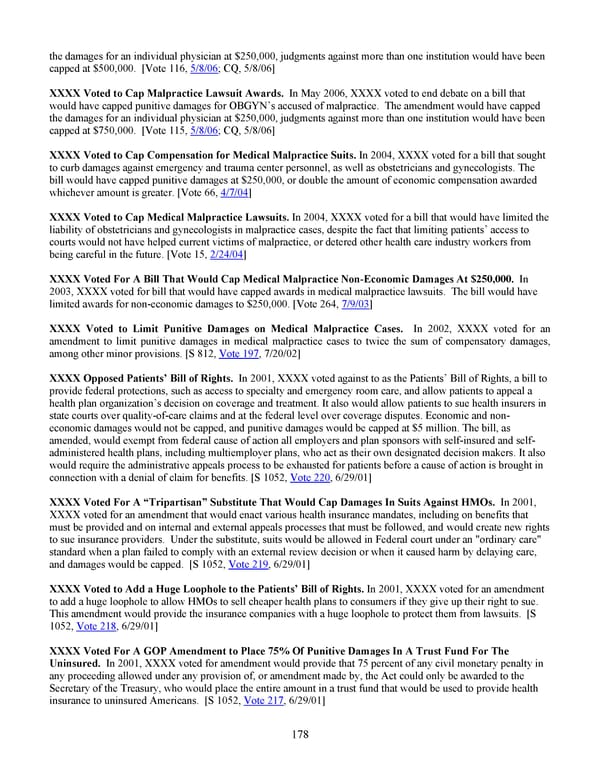the damages for an individual physician at $250,000, judgments against more than one institution would have been capped at $500,000. [Vote 116, 5/8/06; CQ, 5/8/06] XXXX Voted to Cap Malpractice Lawsuit Awards. In May 2006, XXXX voted to end debate on a bill that would have capped punitive damages for OBGYN’s accused of malpractice. The amendment would have capped the damages for an individual physician at $250,000, judgments against more than one institution would have been capped at $750,000. [Vote 115, 5/8/06; CQ, 5/8/06] XXXX Voted to Cap Compensation for Medical Malpractice Suits. In 2004, XXXX voted for a bill that sought to curb damages against emergency and trauma center personnel, as well as obstetricians and gynecologists. The bill would have capped punitive damages at $250,000, or double the amount of economic compensation awarded whichever amount is greater. [Vote 66, 4/7/04] XXXX Voted to Cap Medical Malpractice Lawsuits. In 2004, XXXX voted for a bill that would have limited the liability of obstetricians and gynecologists in malpractice cases, despite the fact that limiting patients’ access to courts would not have helped current victims of malpractice, or detered other health care industry workers from being careful in the future. [Vote 15, 2/24/04] XXXX Voted For A Bill That Would Cap Medical Malpractice Non-Economic Damages At $250,000. In 2003, XXXX voted for bill that would have capped awards in medical malpractice lawsuits. The bill would have limited awards for non-economic damages to $250,000. [Vote 264, 7/9/03] XXXX Voted to Limit Punitive Damages on Medical Malpractice Cases. In 2002, XXXX voted for an amendment to limit punitive damages in medical malpractice cases to twice the sum of compensatory damages, among other minor provisions. [S 812, Vote 197, 7/20/02] XXXX Opposed Patients’ Bill of Rights. In 2001, XXXX voted against to as the Patients’ Bill of Rights, a bill to provide federal protections, such as access to specialty and emergency room care, and allow patients to appeal a health plan organization’s decision on coverage and treatment. It also would allow patients to sue health insurers in state courts over quality-of-care claims and at the federal level over coverage disputes. Economic and non- economic damages would not be capped, and punitive damages would be capped at $5 million. The bill, as amended, would exempt from federal cause of action all employers and plan sponsors with self-insured and self- administered health plans, including multiemployer plans, who act as their own designated decision makers. It also would require the administrative appeals process to be exhausted for patients before a cause of action is brought in connection with a denial of claim for benefits. [S 1052, Vote 220, 6/29/01] XXXX Voted For A “Tripartisan” Substitute That Would Cap Damages In Suits Against HMOs. In 2001, XXXX voted for an amendment that would enact various health insurance mandates, including on benefits that must be provided and on internal and external appeals processes that must be followed, and would create new rights to sue insurance providers. Under the substitute, suits would be allowed in Federal court under an "ordinary care" standard when a plan failed to comply with an external review decision or when it caused harm by delaying care, and damages would be capped. [S 1052, Vote 219, 6/29/01] XXXX Voted to Add a Huge Loophole to the Patients’ Bill of Rights. In 2001, XXXX voted for an amendment to add a huge loophole to allow HMOs to sell cheaper health plans to consumers if they give up their right to sue. This amendment would provide the insurance companies with a huge loophole to protect them from lawsuits. [S 1052, Vote 218, 6/29/01] XXXX Voted For A GOP Amendment to Place 75% Of Punitive Damages In A Trust Fund For The Uninsured. In 2001, XXXX voted for amendment would provide that 75 percent of any civil monetary penalty in any proceeding allowed under any provision of, or amendment made by, the Act could only be awarded to the Secretary of the Treasury, who would place the entire amount in a trust fund that would be used to provide health insurance to uninsured Americans. [S 1052, Vote 217, 6/29/01] 178
 HRC vote skeleton Page 191 Page 193
HRC vote skeleton Page 191 Page 193